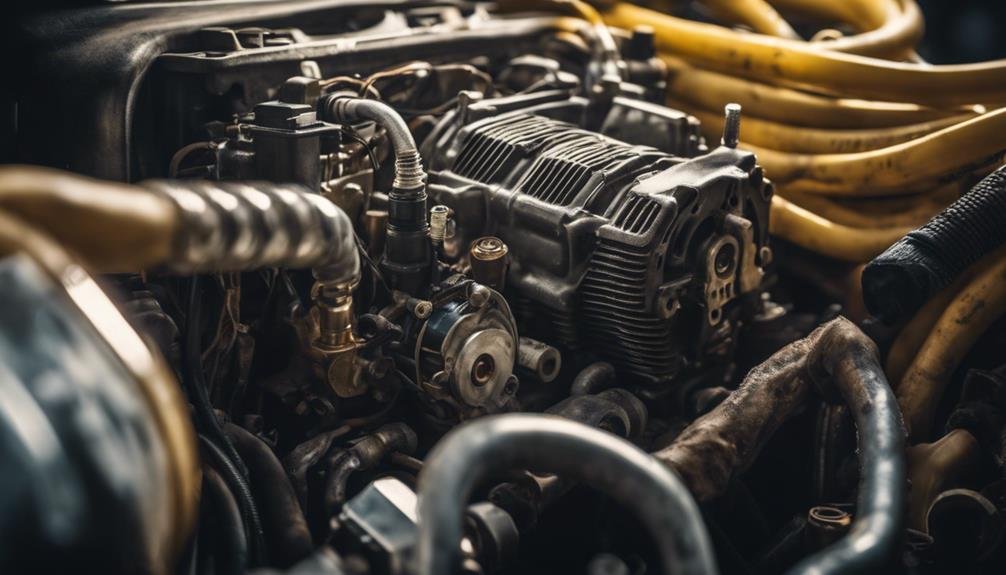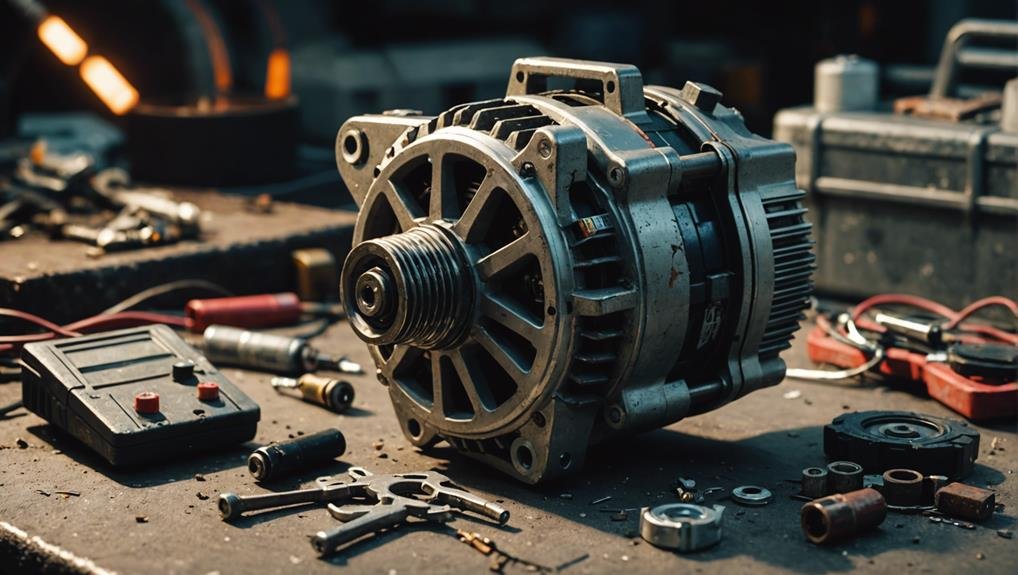If your car's electrical system is malfunctioning, a failing alternator may be the culprit. To identify the issue, listen for unusual engine noises like growling, squealing, or grinding sounds. Dim or flickering headlights, slow or dead batteries, and malfunctioning accessories like lights or radios can also indicate alternator problems. Trouble starting the engine, dashboard warning lights, or a slow engine crank can also signal alternator failure. If you notice any of these signs, have your alternator checked promptly to prevent costly repairs and breakdowns. Continue exploring these signs to understand how to diagnose and address alternator issues effectively.
Key Takeaways
- Unusual engine noises, such as growling, squealing, or grinding sounds, can indicate alternator problems.
- Dim or flickering headlights may signal the alternator is struggling to meet electrical demands.
- A slow or dead battery can be a sign of the alternator failing to recharge it properly.
- Malfunctioning accessories, such as dimming lights, can indicate the alternator is failing to provide stable power.
- Dashboard warning lights, such as the battery-shaped or ALT/GEN light, serve as an early warning system for alternator issues.
Unusual Sounds From the Engine
When you're behind the wheel, unusual sounds like growling, squealing, grinding, or whining coming from the engine should catch your attention, as they can be indicative of alternator problems. These abnormal sounds may signal issues with the alternator's bearings, pulley, or belt, which can lead to further damage and potential breakdowns if ignored.
Growling, squealing, grinding, or whining noises can indicate wear and tear on these critical components. As you drive, listen for any unusual engine noises that might suggest alternator problems. If you notice any of these sounds, don't hesitate to consult a mechanic to diagnose and fix the issue. Prompt attention can prevent costly repairs down the road.
Dim or Flickering Headlights
As you monitor your vehicle's performance, another indicator to watch for is dim or flickering headlights, which can be a telling sign that your alternator is struggling to keep up with the electrical demands of your vehicle.
When your headlights dim or flicker, it may indicate that your alternator is failing to provide consistent power to your vehicle's electrical system. This inconsistent voltage output can cause your headlights to appear dim or overly bright at times, making it difficult to drive safely.
If your headlights dim or flicker while driving, it's a clear indication that your alternator may be failing and in need of attention. A failing alternator can't keep up with the electrical demands of your headlights, resulting in headlights dimming or flickering.
This is a warning sign that your alternator is struggling to provide consistent power to your vehicle's electrical system. Pay attention to these signs, as they can help you identify a failing alternator before it leaves you stranded.
Slow or Dead Battery

You may notice your car's battery is slow to turn over or even dead, which can be a sign that your alternator is failing to properly recharge it. A failing alternator can cause a slow or dead battery, leading to difficulty starting the car.
If you find yourself jump-starting your car frequently, it could be a sign of a bad alternator or battery. Monitoring the battery's performance can help identify early signs of alternator problems.
When the alternator isn't functioning correctly, the battery won't receive the necessary charge, resulting in a slow or dead battery. In addition, dim or flickering lights may indicate an alternator issue affecting the battery's charging capability. It's important to address the issue promptly, as a dead battery can leave you stranded.
If you're experiencing any of these signs, it's crucial to have your alternator checked to avoid being left in the dark. By keeping a close eye on your battery's performance, you can catch alternator problems early, saving you from the hassle and expense of a breakdown.
Malfunctioning Accessories
Malfunctioning accessories, such as power windows, radio, or lights, can be a sign that your alternator is failing to provide a stable power supply. If you notice that your electrical accessories aren't functioning properly, it may be a sign of an underlying alternator issue.
Here are three signs that your alternator may be malfunctioning:
- Slow or intermittent operation: If your electrical accessories are operating slowly or intermittently, it could indicate that your alternator isn't providing a consistent power supply.
- Dimming or flickering lights: If your headlights or dashboard lights are dimming or flickering, it may be a sign that your alternator is struggling to provide a stable power supply.
- Inconsistent performance: If your electrical accessories are performing inconsistently, it could be a sign that your alternator is malfunctioning.
Monitoring the operation of all electrical accessories can help identify potential alternator malfunctions. Keep an eye out for slow operation, dimming lights, or inconsistent performance, as these could be signs that your alternator is failing to provide a stable power supply.
Trouble Starting the Engine

When facing difficulty starting your engine, it's crucial to have your alternator checked as it can be a frustrating and puzzling experience, but it may be a sign that your alternator is struggling to do its job.
If you're having trouble starting your vehicle, it could be an indication of a failing alternator. A weak or failing alternator may struggle to provide enough power to start the engine, leading to slow cranking or multiple attempts to start.
When you turn the key, the alternator plays a pivotal role in providing the power needed to start the engine. If it's not functioning properly, you may experience trouble starting your engine.
Pay attention to any unusual clicking or grinding noises when trying to start your vehicle, as they can be signs of alternator issues. Furthermore, if your lights seem dim or your engine is slow to turn over, it could be a sign that your alternator isn't providing enough power.
If you're experiencing any of these symptoms, it's crucial to have your alternator checked to avoid being stranded with a dead battery.
Whining or Growling Noises
As you turn the key or accelerate, listen for unusual whining or growling noises emanating from the alternator, which can signal worn-out bearings or internal components struggling to function properly. These sounds can be a warning sign that your alternator is on the verge of failure.
Here are three critical things to keep in mind:
- Volume matters: The whining or growling noises may increase in volume as the alternator struggles to function properly, indicating a more severe problem.
- Damage can be prevented: Ignoring these sounds can lead to further damage and potential alternator failure, but prompt attention can prevent costly repairs and ensure the alternator's longevity.
- Watch for accompanying signs: The noises may be accompanied by vibrations or a burning smell from the alternator, which can further indicate internal damage.
Burning Smell From the Engine

While driving, you may notice a burning smell wafting from the engine compartment, which could be a red flag indicating that your alternator is overheating or its electrical components are failing. This burning smell can be a sign of worn-out parts within the alternator, resulting in the smell of burning rubber or wires. If you detect this smell, it's important to address it promptly to prevent potential alternator failure and electrical issues in your vehicle.
Ignoring the smell can lead to further damage to the alternator, which may result in costly repairs or even a breakdown. It's vital to have your alternator inspected by a professional mechanic as soon as possible if you notice a burning smell. They can diagnose the problem and recommend the necessary repairs or replacement.
Don't delay, as addressing the issue promptly can save you from more extensive and expensive repairs down the road. Remember, a burning smell from the engine compartment isn't something to be taken lightly, and it's always better to be safe than sorry when it comes to your vehicle's electrical system.
Inconsistent Electrical Performance
If you've noticed your car's electrical system is acting up, with dimming headlights or malfunctioning accessories, it may be a sign that your alternator is struggling to provide a consistent power supply. This inconsistent electrical performance can manifest in different ways, making it important to identify the root cause.
Here are some common signs of a failing alternator:
- Dimming or overly bright lights: Inconsistent voltage output from the alternator can cause your headlights to dim or shine too brightly.
- Slow or malfunctioning accessories: If your power windows, radio, or other accessories are slow to respond or not working at all, it may indicate inadequate power supply from the alternator.
- Trouble starting or frequent stalling: Power issues related to a failing alternator can cause your engine to stall frequently or have trouble starting.
A failing alternator can lead to a growling noise from the engine, a burning rubber smell, or even trouble starting your car. If you're experiencing any of these issues, it's important to address the problem before it leaves you stranded.
Dashboard Warning Lights

Your car's dashboard warning lights can be a valuable early warning system, alerting you to potential alternator issues before they leave you stranded.
Specifically, the dashboard warning light shaped like a battery or labeled ALT/GEN indicates potential alternator issues. This light is connected to your car's electrical system, which relies on the alternator's voltage output, typically between 13-14.5 volts.
If your alternator is failing, you may notice flickering lights or dimming headlights, signaling fluctuations in voltage output.
Dashboard warning lights are designed to alert you to potential alternator problems, prompting timely action to prevent further electrical system malfunctions and potential breakdowns.
Ignoring these warning signs can lead to more severe consequences, so taking them seriously is crucial.
By paying attention to your dashboard warning lights, you can address potential alternator problems before they leave you stranded.
Slow Engine Crank
When you turn the key and the engine takes longer than usual to roar to life, it may be a sign that your alternator is struggling to provide the necessary power. A slow engine crank can be a symptom of a failing alternator, which may not be providing enough power to the starter motor. This can lead to a weak start, and if left unchecked, a dead battery.
If you notice a consistent slow engine crank, it's important to have your alternator checked by a professional.
Here are three key takeaways to keep in mind:
- A slow engine crank can indicate a struggling alternator.
- A failing alternator may not recharge the battery properly, leading to a weak start.
- Ignoring a slow engine crank can result in potential stalling while driving.
If you're experiencing a slow engine crank, don't ignore it. A professional check can help diagnose the issue and prevent more severe problems down the road. Remember, a struggling alternator can lead to a dead battery and potential stalling, so it's vital to address the issue promptly.
Frequently Asked Questions
How Can I Test if My Alternator Is Bad?
You're wondering if your alternator is bad, so you're trying to test it. Start by measuring its voltage output with a multimeter; it should read between 13.8-14.2 volts while your car is running.
How Do I Know if My Alternator Needs to Be Replaced?
You'll know you need to replace your alternator if you've already identified the problem, and repairs aren't possible or cost-effective, or if the alternator's maturity, mileage, or condition indicate it's nearing the end of its lifespan.
Can Autozone Test an Alternator?
You can get your alternator tested for free at AutoZone, where they'll use specialized equipment to determine if it's charging properly, saving you time and money by pinpointing the issue accurately.
Will a Bad Alternator Drain a Battery When the Car Is Off?
You're wondering if a bad alternator will drain your battery when your car is off. Yes, it can, as a faulty alternator won't recharge your battery properly while driving, leading to drainage when the engine is off.
Conclusion
Now that you've identified the warning signs of a failing alternator, it's essential to address the issue promptly to avoid leaving you stranded.
If you've noticed unusual sounds, dim headlights, or trouble starting the engine, don't hesitate to have your alternator inspected and replaced if necessary.
Remember, a faulty alternator can cause further damage to your vehicle's electrical system, leading to costly repairs down the road.
